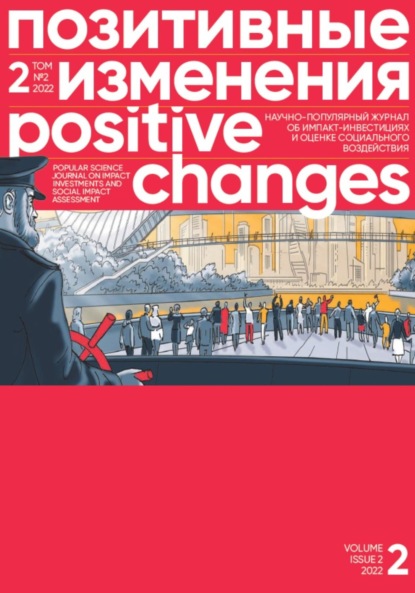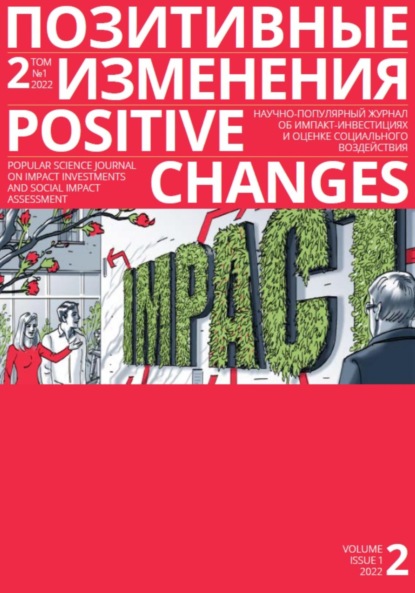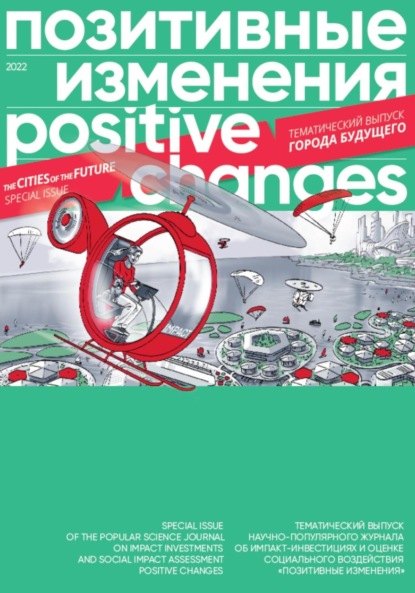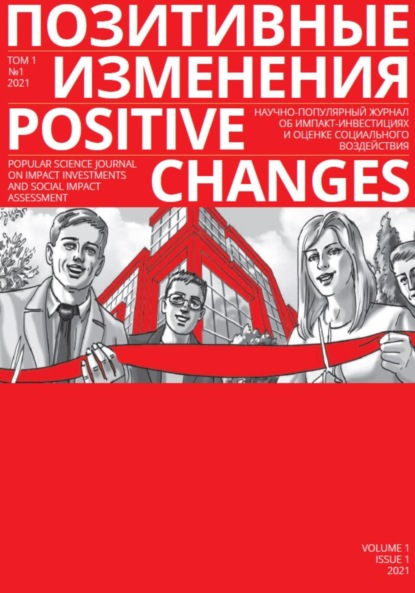 Полная версия
Полная версияПолная версия:
Редакция журнала «Позитивные изменения» Позитивные изменения. Образование. Школа будущего. Тематический выпуск, 2022 / Positive changes. Education. The school of the future. Special issue, 2022
- + Увеличить шрифт
- - Уменьшить шрифт

Редакция журнала "Позитивные изменения"
Позитивные изменения. Образование. Школа будущего. Тематический выпуск, 2022 / Positive changes. Education. The school of the future. Special issue, 2022
От редакции
Сентябрь прочно ассоциируется с началом нового. Накопленные за лето силы дают импульс запускать новые проекты, вносить значимые изменения в свою жизнь и жизнь других людей. Это время метаморфоз – превращений дошкольников в первоклассников, а выпускников в будущих специалистов. Начало нового учебного года.
Тематический выпуск «Образование. Школа будущего», который вы держите в руках, – новый проект научно-популярного журнала «Позитивные изменения». Он объединил материалы, в которых эксперты и исследователи делятся своим видением того, какой может стать Школа будущего. Речь не идет о футуристическом сценарии в духе «когда мы все улетим на Марс». Мы определили Школу будущего скорее как идеальный вариант образовательного учреждения, который в ближайшем времени должен прийти на смену традиционной школе. И главное – фундамент Школы будущего может закладываться уже сейчас, в рамках любого уже существующего проекта как государственной, так и частной школы.
Большая часть материалов тематического выпуска основана на исследовании, проведенном Фабрикой позитивных изменений весной 2022 года. Экспертный опрос, кабинетное исследование, анализ кейсов позволили выделить важные характеристики, которые, вероятно, сложно будет игнорировать при построении любой организации общего образования в ближайшем будущем.
Несмотря на то, что эксперты во многом опираются и анализируют российский опыт, мы считаем, что собранные материалы могут представлять интерес как для практиков (в том числе – родителей, которым интересна тема развития школьного образования), так и исследователей из других стран. Ведь от того, в каких условиях растут и получают образование дети во всем мире, зависит благополучие не только отдельных стран, но и всего мира в самом ближайшем будущем. Недаром качественное образование является одной из целей устойчивого развития ООН на период до 2030 года. Как эта цель будет достигнута, в т. ч. и в наших руках – всех тех людей, кто заинтересован внести свой вклад в строительство Школы будущего.
From the Editor
September traditionally marks the beginning of something new. The strength saved over the summer helps you launch new projects and make meaningful changes in your own lives and the lives of others. This is a time of metamorphoses, with preschoolers transforming into first-graders, and graduates becoming young professionals. The beginning of a new school year.
Meet the "Education. The School of the Future” special issue, a new project of Positive Changes popular science journal. It brings together experts and researchers sharing their vision of what the School of the Future could become. It is not about a futuristic, "when we all go to Mars" scenario. We define the School of the Future rather as the ideal educational institution, which should replace the traditional school in the near future. And most importantly, the foundations of the School of the Future can be laid now, as part of any existing public or private school project.
Most stories in this special issue are based on research conducted by the Positive Changes Factory in Spring 2022. An expert survey, desk research, and case studies highlighted the most important properties that will likely be hard to ignore when building any general education organization in the near future.
Despite the experts largely focusing on and analyzing the Russian experience, we believe that the materials collected may be of interest both to practitioners (including parents who are interested in the topic of school development) and researchers from other countries. After all, the well-being of individual countries, as well as of the entire world in the very near future, depends on the environment in which children are raised and educated. It is not without reason that quality education is one of the UN 2030 Sustainable Development Goals. The way this goal will be achieved is in our hands, among others – in the hands of all those people who are interested in contributing to the construction of the School of the Future.
Гость номера / Special Guest
В центре Школы будущего будет стоять ребенок. Интервью с Александром Мурашевым
Наталья Гладких
DOI 10.55140/2782-5817-2022-2-S1-4-13

Журналист, автор книг «Другая школа» и YouTube-проекта «Нормальные люди», ведущий одноименной программы на радио «Маяк» Александр Мурашев стал гостем тематического номера «Позитивные изменения: образование». Главный редактор журнала Наталья Гладких поговорила с Александром о концепции Школы будущего и о том, как школа может стать твоим жизненным навигатором.

Alexander Murashev

Наталья Гладких
Кандидат психологических наук, ведущий эксперт Центра технологических инноваций Института социально-экономического проектирования НИУ ВШЭ
СООБЩЕСТВО «ГОРЯЩИХ» ЛЮДЕЙ
Александр, первый вопрос нашего интервью, зачем все-таки нужна будет школа в будущем?
Мне кажется, это самый популярный вопрос 2022 года. И есть очень понятный ответ на него: школа нужна, чтобы познавать мир и себя. Помните, как у писателя Ричарда Баха? Он говорил о том, что познавать себя можно только через отношения, потому что сделать это, сидя под деревом, получилось только у одного человека в истории, мы все знаем его имя. Остальным не удается.
Когда ты оказываешься в хорошей школе, происходит идентификация себя и поиск своих. В идеале школа – это сообщество. Наверное, для этого и были созданы профильные классы, когда ты постепенно понимаешь, что тебе интересно и находишь своих. К сожалению, сейчас все эти сообщества по интересам существуют вне школьных стен. Это самые разные детские лагеря, интернет-сообщества.
Вы много общаетесь с учителями. Как они отвечают на этот вопрос?
Недавно департамент образования Москвы проводил уличный опрос и выяснил, что большинство людей считает, что с образованием все очень плохо: «Все же говорят, что плохо, значит это так». И мне очень захотелось снять фильм, который показывает, что хорошие учителя у нас есть в самых обычных школах. Мы отправились в три точки в России: Братск, Биробиджан и Белгород. Это были самые обычные районные школы. Но когда ты спрашиваешь учителей: «Для чего нужна школа? Чему вы учите?», они говорят о том, что самое главное – это «горящие» люди. Я все больше убеждаюсь, что не нужны большие бюджеты, не нужна частная школа, не нужен какой-то супердиректор, чтобы создать сообщество этих «горящих» людей. Я очень дотошно расспрашивал и учеников, и учителей, и директоров. Просто собрались люди, которым действительно хочется преподавать, которые получают от этого удовольствие. Меня радует, что такие люди есть. И, возвращаясь к ответу на первый вопрос, для этого и нужна школа, чтобы друг друга мотивировать и получать удовольствие от общения.
Вы говорите про сообщество, но ведь когда я прихожу в школу, я, в отличие от какого-нибудь кружка по интересам или семейного класса, не знаю, кто там меня будет ждать, и я не выбираю тех, с кем мне учиться.
Абсолютно так, да. Но я верю, что постепенно формируется костяк людей, которые горят тем, что они хотят. Я напрямую спрашивал директоров: «У вас же наверняка есть такие «Марь Иванны», которые не похожи на вас, они по-прежнему считают, что единственный способ воспитания – это как следует ударить линейкой по голове». – «Да, конечно, такие учителя есть у нас». – «Что вы с ними делаете?» – «Да ничего, когда они в нашей среде оказываются, либо они вливаются, либо понимают, что это не их».
Когда ты оказываешься в хорошей школе, происходит идентификация себя и поиск своих. В идеале школа – это сообщество. Здесь ты получаешь мотивацию и удовольствие от общения.
Это как в любом рабочем коллективе. Вы приходите, там все люди разные. Кому-то очень хочется работать, а кто-то просто хочет досидеть до вечера и уехать домой. И, наверное, роль директора школы в том, чтобы собрать вокруг себя таких людей, которые будут не отрабатывать часы, а гореть своим делом.
Как вы думаете, миграция учителей из школы в школу – это нормальное явление?
Мне часто пишут преподаватели: «Я работаю, но кроме меня, таких же идейных, как я, всего парочка на огромный штат, и я не понимаю, как мне быть, не знаю, как творчески подойти к уроку». В таких случаях, да, люди, конечно, уходят в другие школы, чтобы просто найти своих. Я просто не очень верю в то, что можно быть «одним в поле воином». В преподавательской сфере на энтузиазме можно проработать недолго.
Где тогда искать хороших учителей?
Моя последняя поездка для съемок фильма показала, что обычные муниципальные школы берут к себе учителями людей, которые не являются выпускниками педагогических вузов. А приглашают специалистов из разных сфер. Например, человек очень сильно увлекается географией и идет преподавать этот предмет в школу. Грубо говоря, это типаж Аси Казанцевой или Александра Панчина (научные журналисты и популяризаторы науки – прим. ред.). И мне кажется, что это как раз вполне себе рабочая версия, потому что такие люди готовы взахлеб рассказывать о своем деле. Мы платим за их лекции деньги, не понимая, что это тот же самый преподавательский труд, просто мы их называем красиво «популяризаторы», «научные сотрудники». Но, по сути дела, это готовые преподаватели – просто бери их, переманивай в школу, и все, они могут учить детей.
Понятно, что есть такие «звезды» науки, идейные люди со своим взглядом, но еще есть ФГОСы и другие требования к учебным программам. Насколько возможен такой союз?
Он возможен при одном условии, когда у вас нет соревнования эго в школе. Я просто не раз видел в разных школах, когда эти самые «звезды» находятся в конфронтации с руководством школы. Мне кажется, то, о чем мы говорим, часто снимается хорошей коммуникацией между директором и учителями. Если у вас есть диалог, я не вижу никаких проблем в том, чтобы все получилось с учетом ФГОСов.
ШКОЛА – ЭТО ТВОЙ НАВИГАТОР И ПРОВОДНИКЕсли мы вернемся к собирательному образу хорошей школы, которую мы хотим видеть в будущем, какие, на ваш взгляд, у нее есть отличия от типичной школы настоящего?
Один тренд я подметил еще в 201 5-201 6 гг. в европейских школах, и мне кажется, что сейчас он докатывается до нас весьма успешно, в том числе с помощью наших всеобщих усилий – книжек, лекций, просвещения. В центре образовательного процесса стоит человек, ребенок. Мне кажется, что мы до недавнего времени были как таксисты на выходе из аэропорта, когда пассажир в шоке от того, что происходит. А в идеале школа – это как навигатор. Ты говоришь: «Мне нужно туда-то», а тебе навигатор отвечает: «О'кей, я тебя довезу без пробок и по самому красивому маршруту. Доверься мне, я твой проводник».
Однажды мне один известный человек хорошую метафору подарил. Эта метафора применима к журналистам, и к психологам, но мне кажется, в равной степени она применима и к учителям, потому что все мы работаем с людьми. Когда ты что-то делаешь, ты должен помнить, что ты как проводник в горах, ты ведешь за собой людей. Если ты все время выбираешь удобные только тебе тропинки, в конце пути за тобой может никого не остаться. Нужно помнить, что за тобой идут люди, и выбирать дорогу нужно для них, а не для себя.
Школа будущего, идеальная школа построена на том, что сначала ты помогаешь ребенку определиться, куда ему нужно, строишь маршрут, а дальше ты ему помогаешь по этому маршруту идти.
Мне кажется, мы просто переходим от школы уравниловки к школе индивидуального маршрута, попытке идти от интересов ребенка. Это возвращает нас к исконному значению слова «педагог», которое, как вы помните, переводится как «детовод».
Идеальная школа построена на том, что сначала ты помогаешь ребенку определиться, куда ему нужно, строишь маршрут, а дальше ты ему помогаешь по этому маршруту идти.
Встречались ли вам примеры школ, где была выстроена действительно индивидуальная траектория для детей, тот формат, когда учитываются интересы ребенка?
Только один идеальный пример я видел, это школа, которую я описываю в книжке «Другая школа», та самая Kunskapsskolan (Финляндия), где общая школьная программа на всю страну формируется под каждого отдельного ученика. Эта модель как раз масштабируемая, и они ее запатентовали и успешно используют в Англии и в Индии. Это очень сильно впечатлило меня, что можно так делать.
Мне кажется, у нас в России в школе имени А.Н. Тубельского были такие попытки. По крайней мере, я об этом много слышал от выпускников, от учителей, которые там работали. Учителя договаривались между собой, что они с помощью своих дисциплин будут какие-то определенные навыки у детей развивать: навык логического мышления, критического восприятия информации. Каждый преподаватель бил в свою точку из своей дисциплины.
В Новой школе один из учителей делал индивидуальный маршрут на своих уроках истории. Он выстраивал такую систему, когда ты мог прочитать больше, сделать больше работ и получить некий следующий уровень, как в игре. Самый высший уровень – это проведение урока в качестве преподавателя.
Эта индивидуализация образования, как вы думаете, с какого возраста целесообразна? С семи лет, средней или старшей школы? Это хороший вопрос. Психологи сейчас говорят, что возраст подросткового кризиса у детей сдвигается. Если раньше он приходился на 13–14, 15–16 лет, то сейчас он начинается у детей лет с 10. Наверное, имеет смысл говорить о том, что чем раньше ты пробуешь разное, тем лучше. По крайней мере, я абсолютно убежден в том, что насмотренность в раннем возрасте очень сильно формирует тебя в будущем. Я это вижу по своим близким людям и по детям, с которыми общаюсь. А за последние три года я сделал три или четыре тысячи интервью с детьми. Те, у кого есть насмотренность, сильно отличаются от ровесников.
Профессор МГПУ Татьяна Ковалева считает, что наступает время self skills, навыков заботы о себе. Психолог и профессор Александр Асмолов говорит о soft skills как о наборе компетенций, которым должен обладать человек в изменяющемся мире. Как вы думаете, в какой пропорции в Школе будущего могут и должны учить soft, hard и self skills? Во-первых, спасибо Александру Григорьевичу Асмолову, с которым мы поддерживаем очень теплые и тесные отношения, это его заслуга, что про эти навыки столько говорят.
Как это часто бывает в каких-то социальных изменениях, сначала может быть сильный перекос. Сейчас некоторые частные школы позиционируют себя исключительно как школы soft skills, подготовки к бизнес-миру. Но постепенно мы сможем какой-то баланс найти между self skills и soft skills, потому что, к примеру, у учителей и родителей отсутствует навык заботы о себе, среди них много выгоревших. Как говорил один мой знакомый итальянец: «Как ты будешь работать, если ты не отдохнул?»
Эти навыки помогают нам связать предметы с реальной жизнью. Если честно, я большой поклонник phenomenon-based learning[1]. Мне очень нравится обучение на основе явлений, когда ты изучаешь одну глобальную тему с помощью разных дисциплин, и связываешь, таким образом, воедино все предметы.
ДОВЕРИЕ И ОТКРЫТОСТЬ НОВОМУВы упоминали финскую модель образования. В чем ее главное отличие от российской модели?
Вместе с учителями из российских школ мы ездили в поездки по финским школам. Однажды мы приехали в школу, где только-только внедрили обучение через VR-технологии. Уроки биологии, географии, анатомии там проводили с помощью VR-очков. Так вот, наших учителей больше всего волновал вопрос, кто заплатил за эти очки. А финские учителя вообще не понимали, о чем идет речь. Я объяснял, что у нас учителя не могут расходовать бюджеты. И в какой-то момент стало понятно, что ключевое слово для финского образования – это «доверие», доверие со стороны государства к учителям. Учитель может сам, как он считает нужным, менять учебную программу под учеников. Если он считает, что нужны VR-очки, значит, так и будет.
Финский учитель сказал нам: «У нас исторически в обществе есть три категории профессионалов, специалистов, к которым больше доверия со стороны страны. Это учителя, врачи и полиция». И мы такие: «Ну, понятно». В этом и кроется отличие финского образования от российского.
В Финляндии учителя обязаны на законодательном уровне пробовать новые методологические находки, приемы, какие-то техники, то есть их обязывают следить за всем самым новым. И мне кажется, что в этом очень большое отличие.
Мне кажется, нужно отстать от учителей и дать им возможность хотя бы немножко жить вне рамок. Когда тебе каждый второй учитель жалуется на то, что ему тяжело, это лишает возможности творить.
Мне кажется, нужно отстать от учителей и дать им возможность хотя бы немножко жить вне рамок. Потому что, когда тебе каждый второй учитель жалуется на то, что ему тесно, тяжело и надо изворачиваться, это лишает тебя вообще возможности что-то творить. Нам ведь всем нравится работать в свободной атмосфере, чтобы не дергали по разным вопросам.
Может ли Школа будущего быть доступна для любого ребенка без какого-либо входного отбора? Что для этого требуется?
Это моя мечта, если честно. Ведь это, на самом деле, то, за что ругают очень многие частные школы, – за селективность, когда ты отбираешь в школу самых талантливых. Я не очень верю в эту модель, потому что в таких школах, как правило, процветает буллинг. Самое жесткое эмоциональное и физическое насилие происходит в школах, где все друг друга пытаются перещеголять, и где идет невероятное соперничество, к сожалению. И потом, в принципе, очень многие сдаются и сходят с финишной прямой, потому что так невозможно долго учиться.
Я думаю, что доступ в школу без отбора – это точно не вопрос ближайших 10–15 лет, к сожалению.
Если создавать Школу будущего уже сейчас, как это лучше всего сделать?
Любой хороший проект начинается с того, что ты определяешь для себя целевую аудиторию. Я всегда делю любые свои проекты на «что» и «как». Здесь то же самое: что мы хотим от школы, и как мы хотим это сделать. Это две взаимосвязанных вещи.
Дальше нужно, чтобы адресат нашел отправителя, то есть чтобы родительский запрос совпадал с тем, что может предложить школа. Это, кстати, плюс частных школ. Туда приходят люди, которые уже очень четко знают, что они хотят.
Дальше начинается самый главный этап – поиск людей. Я не поддерживаю ту точку зрения, что у нас все очень плохо с учителями в обычных общеобразовательных школах. Они есть, надо просто их искать и вынимать их из тех школ, где им плохо.
Какие из существующих школ в России, на ваш взгляд, ближе всего к Школе будущего?
Наверное, как ни странно, это была школа имени Тубельского при самом Александре Наумовиче. Это была школа, которая опередила свое время. Наверное, еще «Апельсин» Димы Зицера в Санкт-Петербурге, потому что там, действительно, такая модель обучения, которая построена на абсолютной свободе, которую я, честно говоря, больше нигде не видел.
Возможно, я вас удивлю, но это еще и школа № 42 в Белгороде. Меня поразило, что можно собрать сообщество учителей с правильными взглядами и обучением человечности, навыкам 4К[2] на основе абсолютно обычной муниципальной школы. Я бы не стал ее громко называть Школой будущего, но для меня это очень ценный пример.
А если зарубежные школы рассматривать?
Я здесь оригинальным не буду, мне действительно очень понравились финские школы. Например, Saunalahti, Ressu. Шведскую школу Kunskapsskolan я уже упоминал выше. Есть еще школа La Source, которую я последней описываю в своей книжке «Другая школа».
И еще одна школа, которая мне запомнилась своими взглядами на учителей и тем, что наши западные коллеги называют forward thinking, это Ørestad – гимназия без стен в Дании, где действительно есть попытка обучения в open space, когда ты уже со старших классов учишься взаимодействовать с другими детьми, даже через пространство. То есть ты вынужденно учишься с другими бок о бок. С точки зрения директора этой школы, эмпатия – это один из главных навыков XXI века. Мы же часто говорим про личность, но никак эту мысль не подтверждаем. А там идея, что ребенок в центре образовательного процесса.
НУЖНА ПЕРЕУПАКОВКА СМЫСЛОВДавайте поговорим о гуманной педагогике. На мой взгляд, это несколько странный феномен, ведь все знают про Шалву Амонашвили, про его последователей, но при этом на сайте Центра гуманной педагогики меньше 10 школ, которые являются аккредитованными центрами. Стоит ли гуманную педагогику брать в будущее, и если да, то как?
Я очень люблю Шалву Александровича, тем более после того, как он сказал, что «Другая школа» – его настольная книга. После этих слов, я могу свою карьеру завершать, в принципе (улыбается). Но мне кажется, что вопрос в упаковке. За таким красивым названием скрывается очень простая вещь. Это любовь к детям. Любой учитель, который по-человечески относится к своему ученику, это уже, на мой взгляд, гуманный педагог.
Любой учитель, который по-человечески относится к своему ученику, на мой взгляд, гуманный педагог. Нужен человек, который талантливо переупакует идеи гуманной педагогики, сделает их массовыми.
Я бы действовал по методике финского директора Лины Лиусваары, которая меня в свое время очень сильно поразила. Когда мы с ней гуляли по школе Ressu, я увидел, что при всем таком своем инновационном подходе, phenomenon-based learning, там много классов с классической рассадкой учеников. Я говорю: «Это же настолько не похоже на тот образ финской школы, которую мы знаем». Директор мне ответила: «Потому что мы считаем, что неправильно ломать все, что было сделано до нас».
Сейчас я, например, снимаю большой фильм про Льва Выготского. На самом деле, поразительно, насколько много мы используем Выготского, даже не зная об этом. В США я буду общаться с двумя людьми, которые работали в круге Выготского, Лурье. Это Джеймс Верче, Майкл Коул – люди, которые еще помнят ту советскую модель. Мне очень важно в этом фильме показать человека, который на нас всех повлиял, а мы этого даже не осознаем.
В Америке еще живет Елена Бодрова, я тоже с ней буду разговаривать, она вместе с Деборой Леонг написала книгу Tools of the Mind. Она взяла за основу учение Выготского и все, что он говорил про детей, переупаковала и сейчас штурмует американские школы и детские сады на «ура». Книга стала бестселлером, и это заново открыло Льва Выготского американцам.
Мы можем сделать то же самое с гуманными педагогами. Когда мы открываем их труды, то понимаем, что это все написано очень устаревшим языком для современного читателя. Нужен человек, который талантливо переупакует их идеи, сделает их массовыми.
Если обобщить все, что вы сказали, что поменяется в школе в перспективе?
Во-первых, учителя. Будет меньше выпускников педагогических вузов, и в большей степени будут люди из разных сфер.
Во-вторых, родители будут больше работать в паре с учителями, этот пресловутый треугольник «ребенок – учитель – ученик», он будет у нас наконец-то закрытым. Мы точно к этому придем через конфликты и сложности.
Вопрос «где брать учителей?» я тоже задавал разным директорам, и в школе № 18 Братска идет набор учителей из родительского сообщества. В очень многих регионах людям интересна частичная занятость преподавателем. Мне кажется, что это следующий шаг, когда родители будут больше вовлекаться в образовательный процесс.
Очень важный момент – доверие к ученику и доверие к учителю. Например, во время пандемии хорошие учителя знали, что ученики все равно сидят на уроке, даже с выключенными видеокамерами.
Естественно, мне кажется, мы придем к индивидуальному маршруту и к учитыванию интересов ребенка. Моя книга начиналась с того, что школу больше всего упрекают за отсутствие связи с реальной жизнью. Та самая фраза, что мы учим детей тысяче вещей, но, выходя из школы, они не знают разницы между ипотекой и кредитом. Я с радостью вижу, когда захожу в школы в самых разных регионах, свою книжку у директоров. Они говорят: «Вы знаете, настолько важна сейчас идея того, что нужно максимально каждый предмет привязывать к реальной жизни». Часто это очевидные вещи. С иностранными языками все понятно, а как это сделать на уроке математики? Учитель может объяснить скорость движения не через пресловутые обозначения, такие как икс и игрек, а через скорость Интернета и вес файла, который тебе нужно скачать. Мне кажется, в будущем таких примеров точно будет больше.





